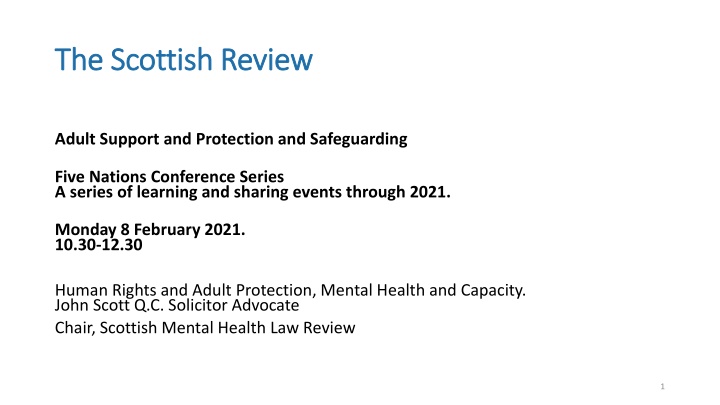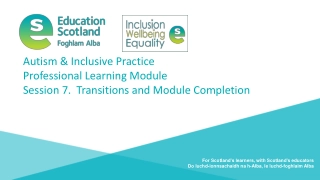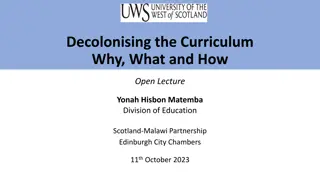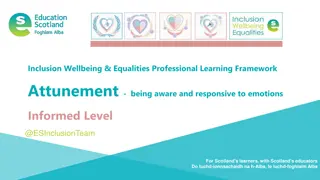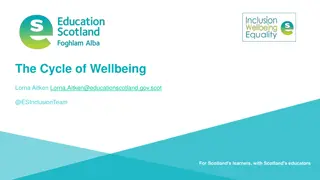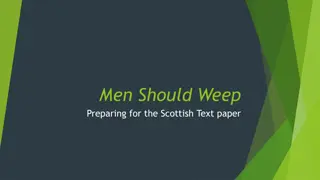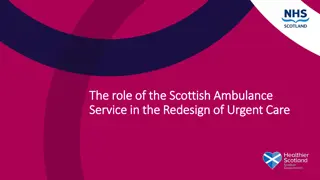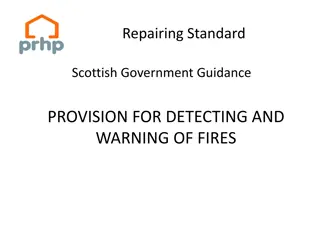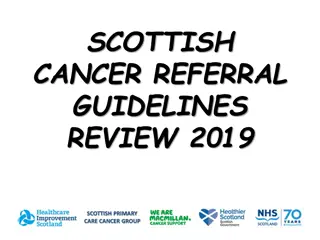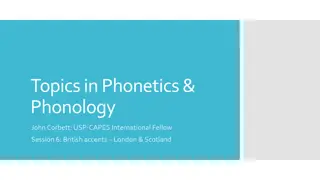The Scottish Review
The Scottish Review presents Adult Support and Protection and Safeguarding in the Five Nations Conference Series for 2021. Join us for a series of insightful and informative events focused on learning and sharing. Engage with experts and peers to enhance your knowledge and practices related to support, protection, and safeguarding.
Download Presentation

Please find below an Image/Link to download the presentation.
The content on the website is provided AS IS for your information and personal use only. It may not be sold, licensed, or shared on other websites without obtaining consent from the author.If you encounter any issues during the download, it is possible that the publisher has removed the file from their server.
You are allowed to download the files provided on this website for personal or commercial use, subject to the condition that they are used lawfully. All files are the property of their respective owners.
The content on the website is provided AS IS for your information and personal use only. It may not be sold, licensed, or shared on other websites without obtaining consent from the author.
E N D
Presentation Transcript
The Scottish Review The Scottish Review Adult Support and Protection and Safeguarding Five Nations Conference Series A series of learning and sharing events through 2021. Monday 8 February 2021. 10.30-12.30 Human Rights and Adult Protection, Mental Health and Capacity. John Scott Q.C. Solicitor Advocate Chair, Scottish Mental Health Law Review 1
Introduction and Outline Introduction and Outline Adult Support and Protection (Scotland) Act 2007 (ASPA) Mental Health (Care and Treatment) (Scotland) Act 2003 (MHA) Adults with Incapacity (Scotland) Act 2000 (AWIA) Overall objective of Acts: to provide support, care, protection and, where necessary, treatment for persons who may be at risk and/or deemed unable to take the necessary steps to ensure their personal well-being (and, on occasion, the well-being of others). Capacity tests for MHA and AWIA; capacity is NOT the test for APSA - capacity may or may not be present. ASPA enacted to address the gap left by the MHA and AWIA. Risk, capacity and consent, and also deprivation of liberty, influence the choice of Act and the procedures used. Mental Welfare Commission for Scotland and Centre for Mental Health and Capacity Law (Edinburgh Napier University), Scotland s Mental Health and Capacity Law: the Case for Reform (May 2017) synergy between the three Acts needs to be improved. Complexities may arise in deciding whether and which protective measures under the Acts should be adopted or in implementing such measures. Can these be addressed by adopting/developing human rights standards? 2
The human rights framework The human rights framework Shaping adult protection Shaping adult protection European Convention on Human Rights (ECHR); and UN Convention on the Rights of Persons with Disabilities (UNCRPD). The principles that underpin all three Acts (s 2 ASPA, s1 MHA and s 1 AWIA) and their criteria for interventions were intended to be ECHR compliant (Human Rights Act 1998 and Scotland Act 1998). ECHR and UNCRPD developments ask us to re-evaluate how we approach adult protection. ECHR rights are directly legally enforceable in Scotland THE FLOOR But, why are we bothered about UNCRPD rights? THE CEILING 4
The human rights framework The human rights framework Shaping adult protection: Equality and non Shaping adult protection: Equality and non- -discrimination discrimination UNCRPD s social model of disability - States (including public bodies) must actively ensure that all obstacles to the equal enjoyment of rights are removed and a person s disability ofitself must not be used to justify interventions. Fundamental human rights requirement that all human beings have the right to enjoy human rights on an equal basis. This has two elements: Some people may need support and assistance to be able to achieve this; and Human rights can still be limited but (1) subject to strict safeguards; and (2)not simply because a person has a particular characteristic, e.g. a physical or mental disability. 5
The human rights framework The human rights framework Shaping adult protection: Autonomy, choice and exercise of Shaping adult protection: Autonomy, choice and exercise of legal capacity legal capacity Article 8 ECHR - the right to respect for private and family life, home and correspondence European Court of Human Rights case law has increasingly made it clear that limiting someone s autonomy is a serious interference with their personal integrity and must therefore be lawful, necessary and in pursuit of a legitimate aim (e.g. public safety, prevention of disorder or crime, health and the rights of others (Article 8(2)). 6
The human rights framework The human rights framework Shaping adult protection: Autonomy, choice and exercise of Shaping adult protection: Autonomy, choice and exercise of legal capacity legal capacity Article 12 UNCRPD Equal recognition before the law Right of disabled persons to exercise their legal capacity on an equal basis with others without discrimination. Such equal exercise requires States to provide access to appropriate support so that that the disabled person s rights, will and preferences are genuinely reflected in decisions made that concern them. UN Committee on the Rights of Persons with Disabilities interprets this radically in order to achieve equality and non-discrimination (General Comment No. 1(2014)). Article 16 CRPD - Freedom from exploitation, violence and abuse 7
The human rights framework The human rights framework Shaping adult protection: the ECHR and UNCRPD message Shaping adult protection: the ECHR and UNCRPD message Ensure that a person s autonomy and legal capacity are preserved as much as possible Is the person being provided with support and assistance to be able to enjoy such rights on an equal basis?; and Avoid making decisions that may be intended for the person s benefit but are actually discriminatory Would the same measures be adopted in the same circumstances for persons without mental disorder or other particular characteristic? 8
Risk Risk ASPA, MHA and AWIA ASPA, MHA and AWIA Risk is a pivotal criterion for intervention under all three Acts. The ASPA measures are designed to support and protect adults at risk . significant risk (to the person s own health, safety or welfare or to the safety of another) is one of the criteria for compulsion (emergency detention, short term detention and CTOs) under the MHA. It is implicit in the criteria for measures under the AWIA. 9
Risk, equality and non Risk, equality and non- -discrimination ASPA, MHA and AWIA ASPA, MHA and AWIA discrimination An over-focus on the inherent status/characteristics of the individual may permit discriminatory interventions. Human rights move us from a status based approach to a functional approach . Whereas in the past, in many contexts, an individual was presumed to lack capacity because of a mental disorder, today such an assumption is no longer valid it depends on the individual circumstances. This potential discrimination is addressed to some extent by the ASPA . Is ASPA, MHA or AWIA most appropriate where a person is at risk and there are capacity issues? It is important to consider how capacity assessments are actually made and whether they are too much influenced by perceptions of risk. Objective? 10
Supporting autonomy and maximisation of capacity Supporting autonomy and maximisation of capacity Active encouraging and supporting a person to exercise autonomy and maximise the exercise of their capacity (supported decision-making) is more likely to result in outcomes that generally reflect their wishes and feelings. Note: the legislative principles: Require that the present and past ascertainable wishes and feelings of the individual are taken into account in relation to the choice and implementation of measures (s 1 MHA; s 1 AWIA; s 2 ASPA). Stress the importance of participation and providing the individual with the necessary information and support to allow them to participate (s 1 MHA; s 2 ASPA). AWARENESS. Place a duty on those responsible for implementing AWIA measures to encourage the exercise and development of the individual s skills to deal with their own welfare, financial and property matters (s 1(5) AWIA). If support for the exercise of autonomy and legal capacity is also provided outwith and before the context of the legislation then arguable that: The need to resort to MHA and/or AWIA interventions is delayed or avoided; and More likely to resort to the less discriminatory ASPA where it is necessary to take steps to protect an individual from harm; or There is no need to resort to any protective measures because the emphasis on support reduces risk element. 11
Supporting autonomy and maximisation of capacity Supporting autonomy and maximisation of capacity Supported decision-making Advance planning, advocacy, peer support, technological support, clear communication, etc. Very limited reference to this in ASPA, MHA and AWIA. More research required on what works. Mental Welfare Commission Good Practice Guide (2016). Resourcing and the support paradigm can it be offset by less need for intervention? 12
Deprivation of liberty Deprivation of liberty Why are we concerned about this? A deprivation of liberty without appropriate safeguards is a violation of a person s right to liberty and these safeguards may also expose other abuses that are or may potentially be occurring. If a person who is unable to give consent (even where they appear compliant) to their living arrangements is under continuous supervision and control and is not free to leave they are deprived of their liberty engaging Article 5 ECHR (the right to liberty) (Bournewood and Cheshire West rulings). Where there is such a deprivation of liberty then the person is entitled to certain legal and procedural safeguards, including a real and effective ability to apply to a court to have the lawfulness of such deprivation of liberty tested (Article 5(4) ECHR; MH v UK). 13
Deprivation of liberty Deprivation of liberty AWIA and Section 13ZA AWIA and Section 13ZA The Scottish courts have ruled that welfare guardians (with appropriate powers) may authorise a deprivation of liberty. However, whilst there are some AWIA safeguards, importantly, the Article 5 ECHR requirement for the ability to apply to a court to challenge lawfulness of the deprivation of liberty is lacking under the AWIA. Section 13ZA Social Work (Scotland)Act 1968 cannot be used where it would result in a deprivation of liberty again, ability to apply to a court to challenge lawfulness of the deprivation of liberty is lacking. The only failsafe way to ensure Article 5 compliance is to deprive a person with incapacity of their liberty under the MHA which has Article 5 type safeguards. However, the criteria for detention under the MHA would have to be fulfilled. 14
Deprivation of liberty Deprivation of liberty ASPA Removal Orders ASPA Removal Orders An ASPA removal order may also result in a deprivation of the adult s liberty. An adult with capacity can refuse to consent to the granting of a Protection Order placing them somewhere else that may deprive them of their liberty (s 35 ASPA). However: The position is less clear where an adult is clearly refusing to consent but is believed not to have capacity to make such a decision. Cannot assume consent from an apparently compliant adult with incapacity. Therefore the need to assess capacity very carefully in these circumstances. Section 35(3) ASPA also provides that sheriff may ignore refusal to consent where there is reasonable belief of undue pressure and a protection order is the only reasonable step to protect the adult from the harm. In each of these cases, to avoid an Article 5 ECHR violation it is necessary to consider supported decision-making and/or whether the AWIA or MHA might be better used instead. 15
Deprivation of liberty Deprivation of liberty 16 and 17 year olds 16 and 17 year olds The confusing Birmingham CC v D (2017) case! Adults who are confined and lack capacity require Article 5 safeguards; For 16 and 17 year olds who are confined and lack capacity (or do have capacity and refuse), those with parental responsibility cannot give valid consent: Article 5 safeguards are required; For those under the age of 16 who are confined and lack capacity (or refuse to give it), parents can give valid consent if that is an appropriate exercise of parental responsibility; For all those under 18 under an interim or final care order who are confined and lack capacity, Article 5 safeguards are required (following A Local Authority v D and others [2015] EWHC 3125 (Fam)). Are 16 and 17 year olds adults or not? UNCRC Suggest follow the existing Scottish legislation and apply both its principles and the Article 12 UNCRPD requirement to provide appropriate support for the exercise of legal capacity for young persons of 16 and 17. 16
Conclusion Conclusion More needs to be done to rationalise and provide greater synergy between the ASPA, MHA and AWIA Acts to ensure that where an individual potentially falls to be considered under more than one this is effectively and consistently achieved. Much can be achieved by bearing the equality, non-discrimination and support requirements in mind when deciding whether and which protective measures under any of the Acts should be adopted and in implementing appropriate measures. Fusion? 17
References References Wayne Martin, Sabine Michalowski, Jill Stavert, Adrian Ward, Alex Ruck Keene, Colin Caughey, Alison Hempsey, Rebecca McGregor, The Essex Autonomy Project Three Jurisdictions Report: towards compliance with CRPD Art. 12 in capacity/incapacity legislation across the UK, June 2016, http://autonomy.essex.ac.uk/eap-three-jurisdictions-report Mental Welfare Commission for Scotland and Centre for Mental Health and Capacity Law, Scotland s Mental Health and Capacity Law: the Case for Reform (May 2017) http://www.mwcscot.org.uk/media/371023/scotland_s_mental_health_and_capacity_law.pdf Mental Welfare Commission for Scotland Supported Decision Making; Good Practice Guide (2016) http://www.mwcscot.org.uk/media/348023/mwc_sdm_draft_gp_guide_10__post_board__jw_final.pdf The Scottish Government in 2016 gave a commitment to give effect to UNCRPD rights in A Fairer Scotland for Disabled People - Our Delivery Plan to 2021 for the United Nations Convention on the Rights of Persons with Disabilities (December 2016) http://www.gov.scot/Resource/0051/00510948.pdf Jill Stavert, To be or not to be an adult is the question: the Birmingham CC v D ruling and deprivation of liberty Mental Capacity Report (Scotland) Issue 81, November 2017http://www.39essex.com/content/wp-content/uploads/2017/11/Mental-Capacity-Report-November-2017-Scotland.pdf 18
